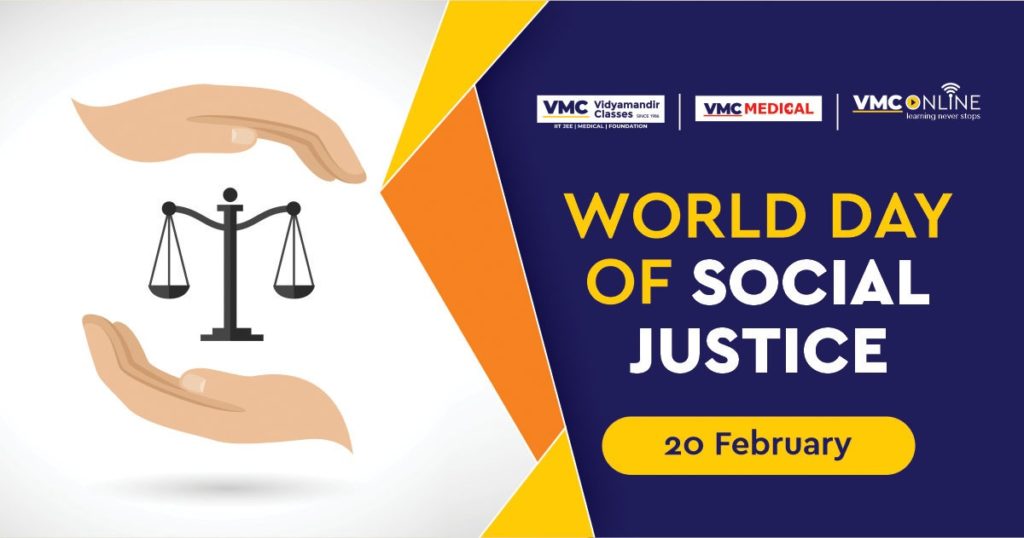WORLD DAY OF SOCIAL JUSTICE
452 total views, 1 views today

Social justice is generally defined as the fair & equitable distribution of power, resources, & obligations. in society to all people, regardless of race or ethnicity, age, gender, ability status, sexual orientation, & religion. The idea of social justice is that all people should have equal access to wealth, health, well-being, justice, privileges, and opportunity, regardless of their legal, political, economic, or other circumstances.
Social justice promotes fairness & equity across many aspects of society. For example, it promotes equal economic, educational & workplace opportunities. It’s also important to the safety and security of individuals and communities.
Equality in opportunities is the essence of social justice & it should be strictly observed especially in India instead of making special laws to give opportunities to a few while denying a few others. The main motto of this day is to make people aware of their rights so that they can speak against social inequality. The major focus that World Day of Social Justice lays on is looking into the possible solutions and changes that can be implemented in society.
In 2022 The UN aims at…
Achieving Social Justice through Formal Employment & Promoting the transition to formal employment is a necessary condition to reduce poverty & inequalities, advance decent work, increase productivity & sustainability of enterprises & expand the government’s scope of action, notably in times of crisis. More than 60 % of the world’s employed population, that is 2 billion women, men, and youth, earn their livelihoods in the informal economy. The COVID-19 pandemic has put a spotlight on the vulnerability of workers in the informal economy. Informal workers, who often lack any form of social protection or employment-related benefits, are twice as likely to be poor compared to formal workers. Most people enter the informal economy not by choice, but due to a lack of opportunities in the formal economy.
The identification of the right incentives and the elimination of obstacles to formality are essential. In the context of the COVID-19 crisis, preventing formal jobs is also of particular importance.
When did the World Day for Social Justice come into existence?
On 26 November 2007, the UN General Assembly declared that starting from the 63rd session of the Assembly, 20th February will be celebrated annually as the World Day of Social Justice. In order to restore social justice, one of the aspects needs to be looked into because that is oftentimes the one thing that leads to unstoppable crime. And that is hunger!
Hunger is a major challenge in all developing & under-developed economies. When we cry for social justice to all, we should keep it in our agenda that HUNGER SHOULD NOT BE AN ISSUE OF CHARITY BUT IT SHOULD BE TREATED AS AN ISSUE OF SOCIAL JUSTICE. HUNGRY STOMACHS DON’T LISTEN TO SERMONS.
There are an end number of issues that our country still faces. The UN has been working towards the progress of not only India but the entire world. Their commitment to resolve some of the most difficult aspects, stay firm. India is a sex-biased country to an extent. The difference between a son and a daughter continues today as well. It’s heartbreaking. There are families who have broken from this mindset, but many still stand audaciously firm. The list is long but if addressed on time, can bring much relief. Following are some of the areas where the need to bring social justice is imperative:
What are women’s social issues?
*Access to Education.
*Employment Opportunities.
*Reproductive Health & Rights.
*Maternal Health.
*Gender-based Violence.
*Child Marriage.
*Water & Sanitation.
On the occasion of World Day of Social Justice 2022, ILO Director-General, Guy Ryder, says the international community has a rare chance that must not be missed to shape a recovery from COVID-19 that delivers social justice for people & protects the planet we all depend on.
The COVID-19 crisis has exacerbated inequalities, both within & between countries. It’s being called the ‘great divergence’. Economic & social divisions have increased. Those who were disadvantaged before the pandemic has been worst affected – youth, women, informal & migrant workers, small businesses.
The ILO’s Member States have unanimously adopted a Global Call to Action on COVID-19 recovery. It calls for a recovery that is human-centered and based on principles of inclusivity, resilience, sustainability, and decent work for all.
